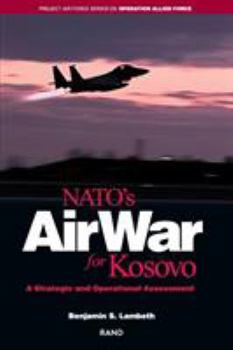NATO's Air War for Kosovo: A Strategic and Operational Assessment
Offers a thorough appraisal of Operation Allied Force from a military, political, and strategic perspective, calling attention to those issues that are likely to have the greatest bearing on future military policymaking.
Format:Paperback
Language:English
ISBN:0833030507
ISBN13:9780833030504
Release Date:November 2001
Publisher:RAND Corporation
Length:276 Pages
Weight:1.20 lbs.
Dimensions:0.8" x 5.9" x 8.9"
Customer Reviews
3 ratings
Great Book
Published by Thriftbooks.com User , 21 years ago
I was very impressed with this book. I have read a number of books on this operation and the book I thought would be the best overall review was the book written by General Clark. Unfortunately, for me that book did not provide much detail on the actual working of the operation. He focused on the political side of the air war and what it took to get the NATO members to play nice with each other. I came away from his book with some details, but a bit disappointed. This book on the other hand was exactly what I wanted. I always love it when I pick up a book and it turns out to completely exceed my expectations. It's like getting a great surprise gift.This book had it all, a good overview of the lead up to the NATO action, a solid review of the weapon systems that were used, when they were used and how they were used, coverage of the operational issues and a good overall political review. I truly think that if you are looking for the one volume book that covers the war from the NATO point of view then this is the one. The book also did a good job in covering the effectiveness of the overall campaign and the working relationship of NATO. The authors did not present it as all success and good feeling, but the true problems that came out of any operation of this size with this many chiefs. He authors do a good job of presenting the difficulties of working on an operation with so many people that have to agree and showing that this organizational structure did more for the Serbian's then anyone else. Overall I thought this was a great book.
The Inelegant Victory
Published by Thriftbooks.com User , 22 years ago
There is little doubt that the 78-day NATO air campaign against Serbia in March-June 1999, dubbed Operation Allied Force, will remain highly controversial for a long time. NATO launched a limited war against Serbia in order to stop the vicious on-going ethnic cleansing campaign in the province of Kosovo and although ultimately Serb President Milosevic "blinked," it was an inelegant victory. Yet the victory was hardly inevitable and until the final weeks the air campaign appeared to be ineffective in bending Milosevic to meet NATO's demands. In NATO's Air War for Kosovo, RAND analyst Benjamin S. Lambeth has written an incisive strategic assessment of the air campaign as part of a US Air Force research project on the operation. Rather than a detailed, blow-by-blow account of the air war, Lambeth offers detailed analysis on the major achievements and problems in Allied Force. While other more detailed books will surely follow on the Kosovo War, Lambeth's volume will certainly be a good place to start in understanding this complex operation. NATO's Air War for Kosovo consists of eight chapters, beginning with two brief chapters that outline events leading up to the air campaign. The air campaign itself is covered a chapter 3, a 50-page summary that covers the main events of NATO air operations but does not provide a day-by-day account. The fourth chapter addresses the possible reasons for the Serb capitulation and stresses that it was not just the air campaign in isolation that prompted this outcome. The fifth chapter covers the three main unique accomplishments of the war: combat debut of the B-2, UAV employment and increased contributions from space-based resources to combat operations. However the heart of this book lies in chapters 6-7, which address friction and operational problems and lapses in strategy and implementation. It is in these 118 pages - 47% of the book - that Lambeth lays out his most significant assessments of the war. Readers will note in the bibliography that Lambeth's source-material derives from two primary venues: contemporary newspaper accounts and post-war interviews with participants. While Operation Allied Force was deemed a victory, it was a disappointing campaign from the military perspective. As Lambeth notes, "notwithstanding its ultimate success, what began as a hopeful gambit for producing Milosevic's quick compliance soon developed, for a time at least, into a seemingly ineffectual bombing experiment with no clear end in sight..." and, "NATO's air war for Kosovo [was] a step backward in efficiency when compared to the Desert Storm campaign." Lambeth lays out the military frustrations of Allied Force in clinical detail, beginning with the inability of the SEAD (Suppression of Enemy Air Defenses) operations to completely shutdown the resilient Serb mobile SAM batteries. The problems with "flex targeting" also prevented the air campaign from seriously hurting the Serb army in Kosovo or even interferin
Balanced, well-written and highly informative
Published by Thriftbooks.com User , 22 years ago
This book is a must read for anyone interested in the role and efficacy of air power. This account is well-balanced giving the story from the pro air power and anti airpower views. It also answers the nagging questions you may have had after reading the incredibly uninformative and shallow accounts in the press. The book posits the reasons. An example -- the book provides the reasons for the need for a credible ground threat for airpower to be effective. Books such as Bombing to Win only state the need. Detailed, nuanced and spot-on accurate.






